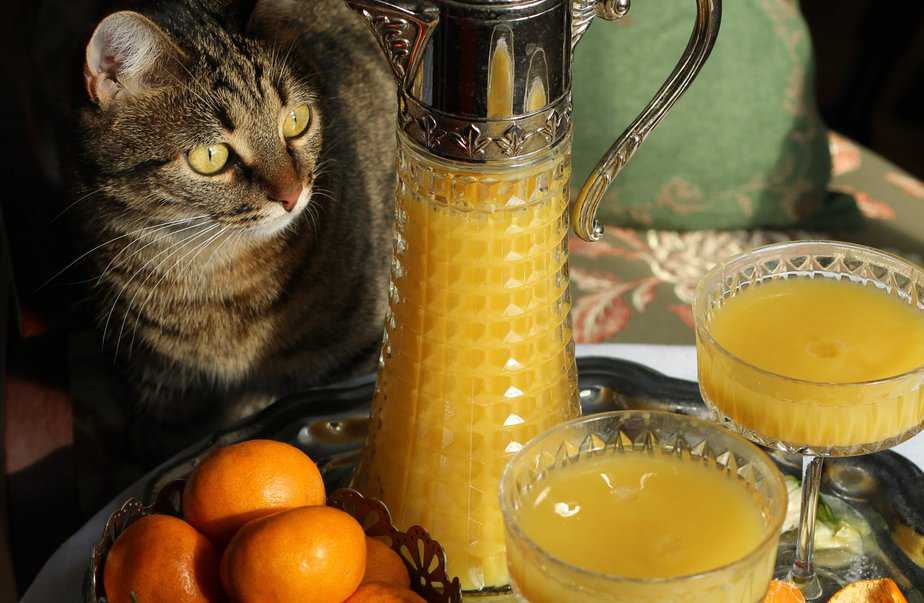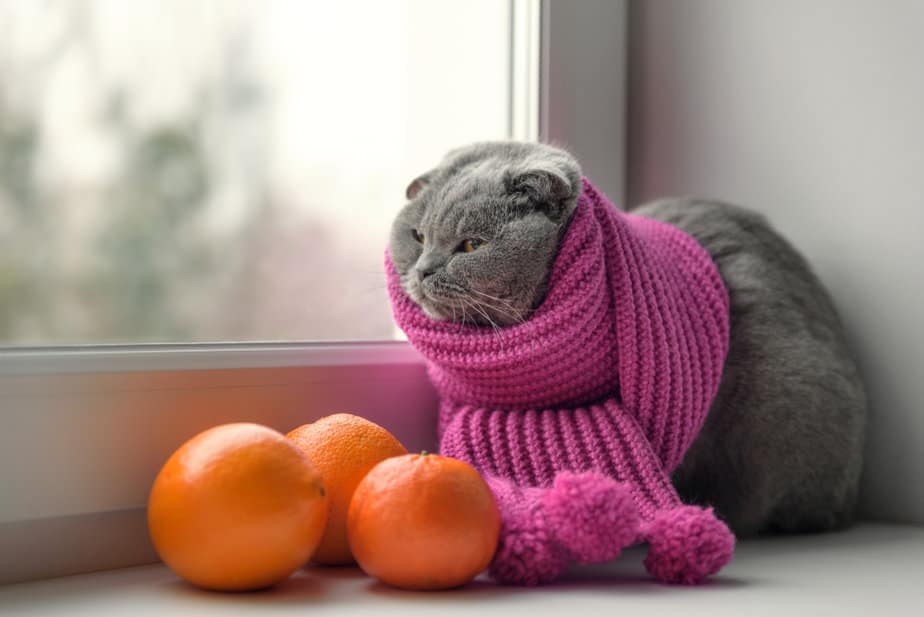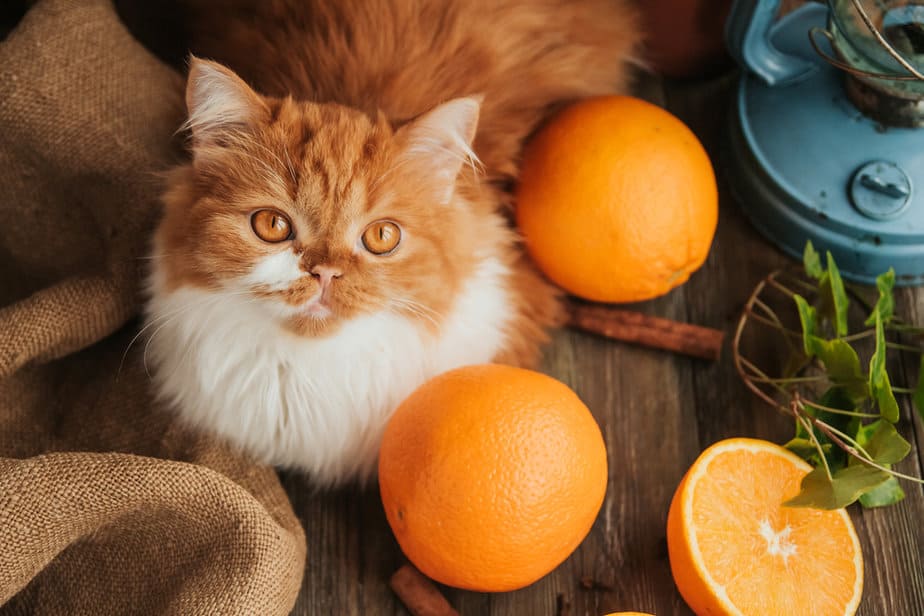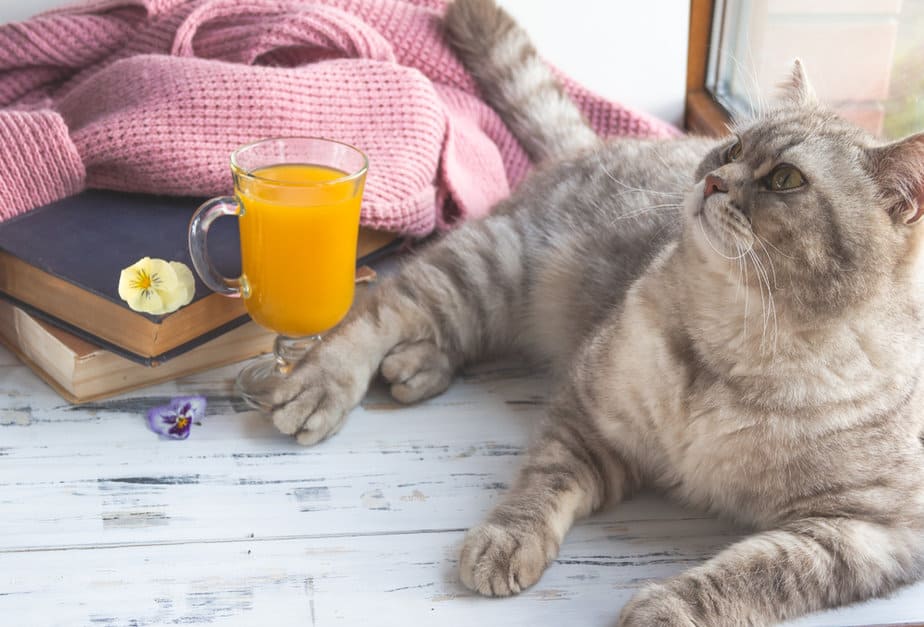📖 Table of Content:
“Orange you glad your curious creature didn’t eat a cherry?” With that hilariously horrible pun out of the way, let’s talk about the complicated relationship your cat has with arguably the most delicious citrus fruit out of the bunch – the orange. But can cats eat oranges?
Your oddball certainly wants to! Whether she sees you snacking on orange slices or sipping on orange juice, she can’t stop meowing and pleading for your to let her have a taste. Saying no to her precious purrs feels like a heartbreak waiting to happen, but…
You have to be honest, oranges are like the Kim Kardashian of citrus fruits. Sure, lemons, limes, grapefruits, and mandarin oranges come close with their delicious taste and versatile use, but oranges have that je ne sais quoi.
They’re packed with vitamins (vitamin C), minerals (potassium, magnesium), and antioxidants. They’re loaded with nutritional and health benefits. Not to mention that they’re a great ally to the immune system, nervous system, and digestive system.
There’s only one problem when it comes to your question of whether cats can eat oranges. Oranges are great for you, but not as much for your cat. According to our friends over at the ASPCA (American Society for the Prevention of Animal Cruelty), oranges are toxic to cats.
Consuming oranges can lead to an array of gastrointestinal and digestive problems, as well as cause damage to her central nervous system. There are several reasons oranges (and other citrus fruits) have such a negative effect on your cat’s health. We’re here to help you figure them out!
Can cats eat oranges, and should they?
Let’s start with the short answer: NO. Cats are obligate carnivores which means that they require predominantly meat in their diet in order to survive and thrive. While that doesn’t mean that they can’t benefit from an occasional fruit or veggie, they’re better off sticking with animal-sourced nutrients.
What do we mean by that? Oranges are packed with vitamin C, right? This vitamin is responsible for the growth, development, and repair of tissue. This vitamin plays an essential role in your cat’s body.
But, your cat doesn’t really need to get this vitamin from oranges because felines can make their own vitamin C. This vitamin gets synthesized in your cat’s liver. This means she doesn’t need to get it from other sources (unless she’s experiencing a vitamin C deficiency, of course).
Let’s not forget about the fact that the smell of citrus makes cats nervous and nauseous. Cat haters and cat trainers often use oranges, lemons, and limes as repellents.
Last, but certainly not least, you might be wondering what exactly makes oranges toxic to cats? Well, these tangy treats contain essential oil extracts known as limonene, linalool, and psoralens, which can cause severe photosensitivity and citrus poisoning in cats.
Let’s just say your feline friend would be better off munching on some blueberries rather than sneaking orange slices out of your Old Fashioned. Cats can’t eat oranges for so many reasons, and here’s what to expect when Ms. McFluffer decides to disobey your orders.
What to expect when your cat eats an orange?
Whether she sneaked a couple of licks of your orange juice or munched on some rogue orange peels, your furry friend might end up rushing to her litter box right away. Her symptoms might range in severity depending on how much orange she scoffed down, so you might want to keep an eye on her.
More times than not, eating oranges – be it the pulp, peel, seeds, or other parts of an orange – results in citrus poisoning. Most symptoms include digestive problems such as stomach aches, vomiting, drooling diarrhea, and constipation, which aren’t as dangerous as you might think.
But, eating oranges can also affect the nervous system. You might notice symptoms such as allergic dermatitis, photosensitivity, tremors, seizures, and depression. And let’s not forget about the damage too much vitamin C can cause to your cat’s urinary tract.
Most of these side effects depend on how much orange your furry friend managed to consume. And, of course, which part of the orange she got her paws on.
Orange peels typically contain higher levels of essential oils, which explains why you should never feed your cat oranges OR orange peels. Most cat owners start panicking as soon as they realize their furry friend ate something she wasn’t supposed to.
So, here’s what you need to do when you realize she sneaked a couple of orange slices while you were busy watching Rachel and Ross fighting over yet another “we were on a break” moment. First things first, contact your vet.
Catch him up to speed and follow his advice to a T. If necessary, schedule an emergency visit and keep a close eye on any changes in your cat’s behavior. Citrus poisoning rarely ends in fatal results, but it’s safe to say that cats really cannot eat oranges.
Can kittens eat oranges?
Having read everything we’ve discussed up until this point, you might already know the answer to this question. But to confirm, kittens can’t eat oranges or any other citrus fruit without facing serious repercussions.
Kittens have a sensitive digestive system and they’re pretty much supposed to only feed off of their mother’s milk. When they get to the ripe age of around twelve months, they’re supposed to level up to kitten food and kitten kibble. But, there should definitely be no oranges in your kitten’s diet.
We’ve mentioned how citrus poisoning almost never ends in fatality, but kittens might even be an exception to that rule. It’s safe to say that you should keep your favorite summer drink far out of your kitto’s reach.
Can cats eat orange peels?
Again, let’s chase right to the chase here: NO. Essential oils are pretty much the main reason oranges have such a negative impact on your cat’s health. Unfortunately, orange peels contain the highest levels of essential oils out of all the fruit’s parts.
Additionally, orange peels contain the highest levels of citric acid, which can lead to numerous gastrointestinal and digestive problems. Let’s just say your furry friend will probably spend the rest of the day in her litter box if she manages to sneak a bite of your candied orange peels.
What about orange seeds?
This one’s another hard NO. As we’ve mentioned in one of the previous paragraphs, oranges are considered toxic to cats because they contain essential oils that can lead to photosensitivity, citrus poisoning, and numerous other health problems.
Along with orange peels, orange seeds also contain high levels of limonene and linalool (which sound like your average lollipop names but are pretty far from harmless). And, to nobody’s surprise, they also contain citric acid, which can lead to stomachache, diarrhea, and vomiting.
But, you have little to worry about because cats aren’t commonly known for their love of orange seeds, lemon seeds, or even mandarin orange seeds.
Can cats have orange juice?
Last but not least, you guessed it, cats cannot have orange juice. Everything we’ve mentioned up to now applies to your favorite summer refreshment.
Orange juice doesn’t contain the same amount of essential oils and citric acid. But, it’s better to stay on the safe side when it comes to your cat’s health. Orange juice contains other harmful ingredients you can’t trace back to orange peels and orange seeds.
So, sugars, artificial sweeteners, and preservatives might be the final nail in the coffin for this tangy human drink.
Conclusion
When life gives you lemons, don’t make any lemonade because you can’t share it with your furry friend. We’ve answered your “can cats eat oranges or other citrus” conundrum definitively with a NO.
Oranges, lemons, limes, and other citrus fruits might lead to numerous gastrointestinal and digestive problems, photosensitivity, and citrus poisoning.
It’s best to keep any citrusy treat for yourself and out of your cat’s reach.





